|
|
|
Sort Order |
|
|
|
Items / Page
|
|
|
|
|
|
|
| Srl | Item |
| 1 |
ID:
130996
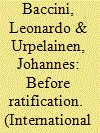

|
|
|
|
|
| Publication |
2014.
|
| Summary/Abstract |
When do international treaties cause domestic policy adjustments? While previous research emphasizes the consequences of treaty ratification, we argue that the need to secure entry into force can induce states to change their policies already before ratification. If a state expects benefits from a treaty, it can increase the probability of foreign ratification by implementing policies that benefit pivotal domestic players within its partner country. Accordingly, studies that focus on policy change after ratification underestimate the importance of treaties and partly misconstrue the causal connection between treaties and policies. We test the theory against data on the relationship between North-South preferential trading agreements (PTAs) and automobile emission standards, finding that developing countries adopt automobile emission standards between the signature and ratification of North-South PTAs.
|
|
|
|
|
|
|
|
|
|
|
|
|
|
|
|
| 2 |
ID:
151438
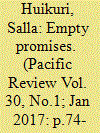

|
|
|
|
|
| Summary/Abstract |
Southeast Asia is one of the most underrepresented regions in the International Criminal Court (ICC). I address the question of non-ratification of the Rome Statute with a case study on Indonesia. While the Yudhoyono Administration has repeatedly promised to join the ICC, ratification has not materialized. I argue that Indonesia's tradition of emphasizing the protection of state sovereignty and economic gains in its foreign policy decisions best explains why it remains outside the ICC's jurisdiction. I test this claim by exploring Indonesia's human rights record, potential legal restrictions for the ratification of the Rome Statute, and the influence of domestic political players and external pressures.
|
|
|
|
|
|
|
|
|
|
|
|
|
|
|
|
| 3 |
ID:
192521
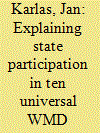

|
|
|
|
|
| Summary/Abstract |
Much of what we know about state participation in universal weapons of mass destruction (WMD) treaties is based on research about the Nuclear Non-Proliferation Treaty (NPT). This article instead analyzes the ratification of all ten current WMD treaties. Using a survival analysis of ratification events (1960–2022), it challenges conventional wisdom. It shows that security threats—a factor stressed by neorealists and research on the NPT—provide only a weak and incomplete explanation. Instead, three types of costs and benefits influence ratification decisions: policy change costs, benefits from the secondary functions of treaties, and benefits from the conformity with the ratification behavior of regional peers. More specifically, the article finds that the possession and pursuit of WMD delays ratification. The country’s support for the liberal hegemonic order, the level of its economic development, and a high regional ratification rate of the respective treaty increase the probability of ratification.
|
|
|
|
|
|
|
|
|
|
|
|
|
|
|
|
| 4 |
ID:
155712
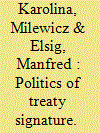

|
|
|
|
|
| Summary/Abstract |
The literature on international cooperation through legal commitments focuses chiefly on treaty ratification. What has received much less attention is that before states ratify treaties, they commit to treaties through the act of signature. This article addresses this research gap by investigating how a state’s decision to sign a treaty is affected by its diplomatic representation during treaty negotiations. Conceptualizing signature as a commitment step, we argue that participation in treaty negotiations translates into a “ties-that-bind” effect creating incentives for diplomats to support the treaty text leading to treaty signature. Our empirical analysis uses a new data set on signature and tests the argument for 52 multilateral treaties concluded between 1990 and 2005. Results confirm that participation in treaty making matters for signature but not necessarily for ratification.
|
|
|
|
|
|
|
|
|
|
|
|
|
|
|
|
| 5 |
ID:
182646


|
|
|
|
|
| Summary/Abstract |
The Treaty on the Non-Proliferation of Nuclear Weapons (NPT) faced a serious threat only a few years after it came into force in 1970. India’s “peaceful nuclear explosion” (PNE) in May 1974 rocked the nuclear-nonproliferation regime and cast doubt on the prospects of the NPT. Yet during the two years following the PNE, several significant countries ratified the treaty. Why did states that had been notable holdouts, like Italy, Japan, and South Korea, ratify the treaty soon after the Indian nuclear test? This article finds that the PNE galvanized pro-NPT forces in the United States and Canada, leading to changes in nonproliferation policy. In particular, it led them to threaten to withhold access to nuclear technology and materials unless the holdouts ratified the NPT. It also motivated Secretary of State Henry Kissinger to change his secret advice to Japan that the United States did not want Japan to ratify the NPT in order to keep the People’s Republic of China unsure about Japan’s nuclear intentions.
|
|
|
|
|
|
|
|
|
|
|
|
|
|
|
|
| 6 |
ID:
140815


|
|
|
|
|
| Summary/Abstract |
Under what circumstances do new constitutions promote democracy? Between 1974 and 2011, the level of democracy increased in 62 countries following the adoption of a new constitution, but decreased or stayed the same in 70 others. Using data covering all 138 new constitutions in 118 countries during that period, we explain this divergence through empirical tests showing that overall increased participation during the process of making the constitution positively impacts postpromulgation levels of democracy. Then, after disaggregating constitution-making into three stages (drafting, debating, and ratification) we find compelling evidence through robust statistical tests that the degree of citizen participation in the drafting stage has a much greater impact on the resulting regime. This lends support to some core principles of “deliberative” theories of democracy. We conclude that constitutional reformers should focus more on generating public “buy in” at the front end of the constitution-making process, rather than concentrating on ratification and referendums at the “back end” that are unlikely to correct for an “original sin” of limited citizen deliberation during drafting.
|
|
|
|
|
|
|
|
|
|
|
|
|
|
|
|
| 7 |
ID:
110830
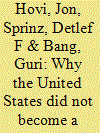

|
|
|
|
|
| Publication |
2012.
|
| Summary/Abstract |
According to two-level game theory, negotiators tailor agreements at the international level to be ratifiable at the domestic level. This did not happen in the Kyoto negotiations, however, in the US case. We interviewed 26 German, Norwegian, and US participants in and observers of the climate negotiations concerning their views on three explanations for why the United States did not become a party to Kyoto. Explanation 1 argues that Kyoto delegations mistakenly thought the Senate was bluffing when adopting Byrd-Hagel. Explanation 2 contends that Europeans preferred a more ambitious agreement without US participation to a less ambitious agreement with US participation. Finally, explanation 3 suggests that in Kyoto the Clinton-Gore administration gave up on Senate ratification, and essentially pushed for an agreement that would provide them a climate-friendly face. While all explanations received some support from interviewees, explanation 1 and (particularly) explanation 3 received considerably more support than explanation 2.
|
|
|
|
|
|
|
|
|
|
|
|
|
|
|
|
|
|
|
|
|